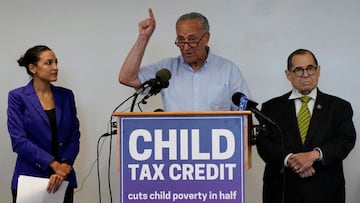What's the difference between stimulus checks and the new Child Tax Credit?
The IRS has overseen various relief programmes since the start of the pandemic and is set to start sending payments as part of the new Child Tax Credit this week.


The IRS is preparing to distribute the first round of the monthly direct payments as part of the new Child Tax Credit. The tax authority is slated to begin sending out the support on 15 July but there is still concern that many potential beneficiaries are unaware of the programme.
Speaking to Forbes recently, Omeed Firouzi, attorney with Philadelphia Legal Assistance, said: “It's really important that we spread the word about this. I think I saw a poll a few weeks ago that said that 53 percent of individuals were not even aware that this credit had been expanded and that there were advance payments.”
Read more
- $3000/$3600 Child Tax Credit: Will President Biden extend it to 2025?
- How to apply for the 2021 Child Tax Credit
- Millions now qualify for tax credits to bring down the cost of health insurance
- Biden administration cancels $55.6 million in student debt
The new Child Tax Credit has been compared by some to the three rounds of stimulus checks, but in reality there are a number of key differences. We take a look at the two forms of financial relief…
Child Tax Credit monthly payments
The first big change to the Child Tax Credit introduced by the American Rescue Plan is the monthly payment schedule, which is designed to help families budget throughout the year. Parents with children under the age of six will receive a monthly payment of up to $300 per child; those with children aged between six and 17 will get up to $250 per child.
"According to a Data For Progress poll conducted in May, 53% of the poll’s respondents expressed knowing little or nothing about the monthly Child Tax Credit payments, which are expected to cut child poverty in half."https://t.co/515vFbFS1F
— Data for Progress (@DataProgress) July 5, 2021
There is real optimism about the impact that the new programme will have and there are already widespread calls for it to be extended. Unlike the stimulus checks, the Child Tax Credit has been given a fixed term of funding, which equates to 12 months of payments. President Biden has included a provision in his American Families Plan to extend the payments through 2025, while many Democrats in Congress are calling for the support to be made permanent.
Little chance of further stimulus checks
The three rounds of stimulus checks issued during the pandemic have been hugely popular and offered a vital boost for household finances, but they are seen as more of an occasional necessity than a long-term solution.
Related stories
Each of the three stimulus checks has provided a single direct payment, rather than the recurring payments that some people have demanded. Various groups of Democrats in Congress have signed letters calling for a recurring stimulus check and an online petition asking for the same has drawn over 2.5 million signatures. However, there appear little chance that recurring stimulus checks are in the offing.
As I’ve said again and again: The people who really need a tax break in this country are working families. That’s why my Build Back Better Agenda will extend the expanded Child Tax Credit we passed under my American Rescue Plan.
— President Biden (@POTUS) July 9, 2021
The White House has repeatedly downplayed the likelihood of a fourth stimulus check, with Biden having not mentioned the prospect for months. While there remains an appetite across the country it appears that the President’s sights are now set firmly on securing an extension to the reformed Child Tax Credit instead.

